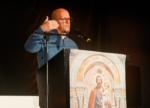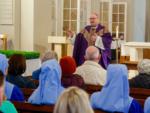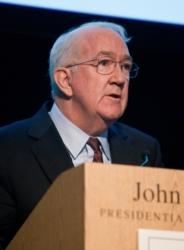Much remains to be done in Haiti, says CRS head
BOSTON -- Today, much of Port-au-Prince and the area surrounding the Haitian capital city is marked by rubble following a devastating earthquake in January. As the area lies in ruins, the challenge of rebuilding remains, according to Ken Hackett, the president of Catholic Relief Services, the relief and development arm of the U.S. Conference of Catholic Bishops.
CRS is coordinating the Catholic Church’s response to the recent Haitian earthquake, and according to Hackett, relief should focus on more than just short-term fixes. Rather, relief must provide lasting solutions to political and economic problems that have plagued the country for awhile.
“Haiti didn’t (just) get in to the situation it is today. It’s been in that situation for a long time,” Hackett said. “To wish it away is not going to be adequate. There’s going to have to be real leadership in the Church, government, and society.”
In a May 21 interview with The Pilot at Boston Catholic Charities headquarters, Hackett called on the Haitian people, the Catholic Church, and the Haitian government to provide the leadership that can establish effective long-term solutions that will allow Haiti to rebuild following the earthquake.
Hackett spoke to The Pilot while on a visit to Boston. The evening before, Hackett accepted Catholic Charities’ annual Justice and Compassion Award at their annual gala at the John F. Kennedy Presidential Library and Museum.
In its wake, the earthquake left numerous damaged and destroyed buildings in the urban areas like the presidential palace and cathedral, as well as houses of the wealthy and middle class on the outskirts and mud homes in rural areas.
One of the critical challenges, Hackett said, is to find job opportunities for those who fled Port-au-Prince, a problem exacerbated by the fact that, even before the earthquake, there were few industries in Haiti and that the country’s agricultural economy is “already weak.”
A sound economic environment would inspire people to invest, Hackett said, which in turn would create job opportunities. To that end, Hackett called on the government to foster a secure economic environment that would limit corruption and would be conducive to individual entrepreneurialism.
“Then, you will get Haitians and others going back and setting up factories,” he said.
Hackett also discussed the importance that strong political leadership plays in the relief efforts, particularly in utilizing the combined $9 billion pledged towards the relief efforts by other countries.
Haiti will hold a presidential election in 2011.
“For that money to be actualized in to something good, you need leadership,” he said. “You need a plan. That’s what we have yet to see.”
“You just need a leader to arise who can set out a vision for what the future could be and find a way to engage all aspects of society in that vision,” he added.
Immediately after the earthquake, CRS was there providing temporary relief for about 750,000 displaced people, Hackett said, which included tarps, water, sanitary needs, and day-care centers. Hackett added that the emergency assistance will continue in the coming months.
The organization also has other relief goals for the Caribbean island country as well.
CRS is mobilizing to provide 7,000 transitional shelters constructed of plywood that have a tin roof, and will be structurally suitable for between three to five years, Hackett said.
In addition, CRS is helping to run St. Francis de Sales Hospital, a facility of the Archdiocese of Port-au-Prince which collapsed in the quake. Hackett said the hospital is being run at a nearby seminary while it is being rebuilt and converted into a 150-bed teaching facility.
Along with three other teaching hospitals in the country, Hackett said those facilities will provide opportunities for the students of the University of Notre Dame of Haiti medical school.
CRS will continue to facilitate an antiviral treatment program for those with HIV/ AIDS, Hackett added.
CRS is providing relief for the Catholic Church in Haiti, building transitional shelters for parish priests so they can live among their people, and will set up tents to house a seminary that collapsed, he said.
CRS is also working with architects and engineers from throughout the world to help reconstruct Church property.
Their five-year relief plan will address both immediate and long-term needs.
“Our role in there is also to help coordinate the Catholic response as best we can,” Hackett said.
CRS has received $140 million from the United States, mostly from Catholic donors. The organization has also received funding from the federal government and the United Nations. Locally, the organization received about $2 million from parishes of the Archdiocese of Boston, funds raised through special collections earlier this year.
“We’re trying to satisfy a lot of people in a lot of ways and be good stewards of the money entrusted to us,” he said. “We will not waste it.”
Hackett credited the work of the United States military in aiding CRS relief efforts. He praised the 82nd Airborne Division for creating a safe and secure environment in which to conduct relief operations.
In all, CRS employs a staff of over 500 people in Haiti, 90 percent of them Haitian. 300 employees work in Port-au-Prince and the other 200 work in the southern part of the country.
CRS has been in Haiti for 55 years.
For over half a century, CRS has facilitated programs for feeding children and more recently an anti-viral program for people with AIDS. The organization has also worked to support loans for individuals to start small businesses and coordinated responses to natural disasters like hurricanes and mudslides.
“What we’re trying to do is shore up and build the capacity within the Catholic Church to be an effective instrument of social assistance within the country,” Hackett said. “We’re trying to do it in a way that is respectful of the dignity of Haitians and do it in a way that supports the empowerment of them and the local Church rather than doing it ourselves.”
CRS works in 100 countries currently. In addition to relief work in Haiti, other major relief projects include feeding roughly 400,000 people in Darfur, assisting people in southern Sudan prepare for a referendum on whether they should secede from the northern part of the country, aiding the hungry in Niger, Ethiopia, and East Africa, and helping those affected by war in Sri Lanka.



















